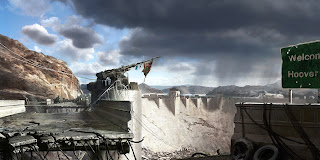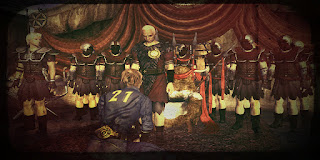What a delight. What a triumph. I honestly think this is the most fun I've had playing a computer game. And I've been playing this in fits and starts going on for over four months now, so to sustain that kind of momentum is quite something. Fallout: New Vegas is the first open-world RPG I've played, and I really went all-in on it – completing every major side-quest and companion quest during my playthrough. Looking back, I marvel at the lack of filler and flab. Obsidian took Baldur's Gate 2's ambition to never waste the player's time with boring things to see and do and just kept adding more and more interesting things to see and do. What an achievement.
The developer has made a name for itself exploring the grey areas in between the traditional good-and-evil moral landscape of video games. New Vegas has a myriad of factions, four of which can make or break the Mojave. Your character's allegiance decides the world's fate – but it's never an uncomplicated choice. The New California Republic is the 'good' path – especially for players who have watched (and perhaps abetted) the rise of the NCR through Fallouts 1 and 2. But here you're on the fringes of their push east, and you are constantly confronted with evidence of imperial overreach. The bureaucracy is inefficient and bedevilled by corruption. The army cannot keep the roads safe. The people chafe at the imposition of new rules and taxes. The lofty ideas that the country was founded on are being tested by the realities of governing an unruly patch of the post-apocalypse. The player can bolster the faction back to glory, but there is nonetheless the sense of moral decay and political decline to their project.
Like Byzantium facing the rise of the Arabs, the NCR is confronting the creation of a new empire in the east. Caesar's Legion present the player with the 'evil' path to victory. They have a very powerful and disturbing introduction in the town of Nipton, which the player approaches at the end of an orchestrated massacre designed to terrorise the region. The Legion is inspired by the NCR's weaknesses, which are attributed to those ideals – democracy, tolerance, freedom under the law – that would endear them to the player. Instead, Caesar has taken inspiration from pre-modern civilisations built on slavery, racism, patriarchy, military ruthlessness and the cult of a divinely-inspired monarch. The Legion are gruesome, but their religious attachment to their war leader has given them a unity of purpose that has made them effective. If the Nazis made the trains run on time, the Legion keep the roads safe – even if it is through terror. Caesar's argument to the player is that these medieval values are what can bring order to the chaos of the wasteland. He wants New Vegas to be his Rome – a glittering jewel of civilisation upheld by the fervour of his devoted legionaries. It's not an attractive vision of the future, but it's a more subtle one than that of would-be dictators in other media.
If Caesar finds his roadmap to power in the distant past, Mr House presents the player with the opportunity to harness the tools of the future. He is a scientific genius – Tony and Howard Stark rolled into one and multiplied by twelve – who used his brilliance to shield Vegas from the nuclear warheads. He has built an army of robots to keep the peace in the city – and wants the player's help to upgrade it so that he can push both the NCR and the Legion out of the Mojave and rule it himself. Mr House offers huge wealth to entice the player, but also suggests that his genius can build a technological wonderland that can not only restore what was lost but propel humanity to the stars. It's Silicon Valley utopianism that nonetheless strips the vast majority of any political rights or power. Mr House is the philosopher-king to Caesar's bloodthirsty emperor – a more attractive proposition, but one that still has a dark side.
The final option is to reject the other three – and is probably the most appealing to most players. Mr House needs a MacGuffin – the Platinum Chip – to power up his army. You are the Courier who has been dispatched to deliver it from where it was buried in the west. But at the start of the game, you are intercepted by Benny, who shoots you in the head and takes it for himself. Benny is a slimeball wheeler-dealer voiced by Matthew Perry who's managed to hotwire one of Mr House's robots and has learned of the army lying dormant deep in Legion territory. His plan is simple – use the Platinum Chip to steal the army for himself, take Mr House's place and liberate New Vegas from his oppressive rule.
His mistake was to mess with the wrong Courier. There are a lot of different ways to deal with Benny once you've recovered from your head-wound and have caught up with him. In my playthrough, he ran away and I found him tied up in Caesar's tent having failed to infiltrate the robot army bunker. Caesar gives the player the opportunity to dispatch Benny – a fittingly poetic reversal of the beginning of the game where Benny has you at his mercy and shows you none. Killing Benny may be satisfying, but the game gives the player an opportunity to redeem him as well. He's a scumbag, but he's not a coward – he's accepted that his life is at an end, and in his final moments he tries to convince you to finish what he started. And you can kill him promising that you'll fulfil his wish to make Vegas swing again. It's one of the most emotionally complicated moments I've ever come across in games.
The independent path seems to leave you in charge, although in the final moments of the game Benny's hotwired robot 'Yes Man', which you've installed as a substitute for Mr House, drops the hint that it might upgrade into something more authoritarian that may slip out of your control. But the fundamental ideological conflicts between the factions remain – how do you strike the balance between liberty and authority, and does Mr House's technology inevitably imperil democracy?
The DLCs take up that second question and run with it – introducing several Mr House-equivalents digging through the wreckage of the old world to uncover wondrous innovations and dangerous weapons. Dead Money is one long metaphor for obsession and addiction, fittingly centred on an old world casino stuffed with miracle technology and more gold than you could ever dream of carrying out with you. The villain is Father Elijah, who gambles with his own life and the lives of others in order to crack open its mysteries and use an army of unstoppable holograms to reconquer the Mojave. You stop him, of course, although the option to join with him and unleash a second darkness on the world was added in for players who need more thanatos in their lives.
Old World Blues is a comedy DLC with a serious message – its squadron of superbrains must be forced to forget their past so they don't use the enormous pile of dangerous weapons they sit on to take over the world for themselves. Fallout takes place after a nuclear apocalypse, and all of these investigations into the perils of science could be interpreted as metaphors for the bomb. The final DLC Lonesome Road makes this more explicit. The DLCs were helmed by Torment narrative designer Chris Avellone, and there's definitely a Torment echo to you uncovering your backstory to reveal a great crime – you delivered a piece of tech that accidentally set off a nuclear arsenal and incinerated a community that you had a hand in creating. The DLC incongruously introduces you to a little minigame where you use a laser to detonate other warheads lying around the wreckage – forcing you to continue to repeat your original sin in order to move forward. The villain Ulysses enjoys this historical irony, and is generally obsessed with the way history keeps repeating itself. All empires fall – and you have to convince him that instead of succumbing to nihilism and accelerating that process, it's better to keep trying to rebuild.
All of these grand themes are set against hundreds of smaller stories of people struggling to survive in the Mojave. New Vegas probably takes narrative complexity as far as it can possibly go in a fully-voiced 3D first-person game. The writing is never lazy, and the voice-acting is almost always excellent. The set of companions you encounter have rich backstories and involving personal missions, although not all are equally well-developed. Veronica is gradually losing faith in the secret society she was born into, and you can help her decide whether to stay and try to make it better, or abandon it forever to forge her own path. Arcade is also trying to escape the shadow of his upbringing – he's a peacenik doctor but his family were part of the facsistic remnants of the US government that were defeated in Fallout 2. He can either embrace that legacy and try to fight for something better, or renounce violence and go back to treating the sick. Boone's story is possibly the most tragic – he is hollowed out and close to suicidal after participating in a war crime and following the death of his wife. He hunts down the Legion incessantly in the hopes for a meaningful death, but through your adventures you can help him find a meaning in life again. There are no romances in New Vegas, but I liked to imagine my Courier was lowkey in love with Boone, all the while knowing that love could never be reciprocated.
The one blemish on the game is the second DLC Honest Hearts. It's most appealing feature is the lush environment of the national park, but the actual missions are dull and badly designed, supposedly offering you stealth or violent options while in practice making stealth almost impossible. Thankfully it's short, and its story is not well-integrated into the rest of the game, so it's an easy one to forgo entirely.
The game is very buggy, and you're advised to do quite a bit of patching and fiddling on PC before you begin in order to avoid crashes and glitches. Although I had a couple of crash-to-desktop moments, by some miracle all my quests (and I did a lot of quests...) triggered correctly and completed or failed as you would expect. In general, the play isn't difficult – and the GOTY version is made easier by the addition of a heap of high-value equipment to get you started. The main challenge comes from entering areas and fighting monsters you're not ready for. The DLCs up the challenge significantly, but they warn you in advance about the level your character should be before you attempt them, and Dead Money's survival horror gameplay does a good job of resetting the power curve if you come at it when you're a level 35 beast like I was. There are a couple of set-piece encounters that stay with you, such as taking out the deathclaws in the quarry or the radscorpions at the airport. But mostly this is a game about talking to people about their stories and making choices about how those stories should resolve, all of which is presented with a care and intelligence that preserves the game's place among the pantheon of western RPGs.







